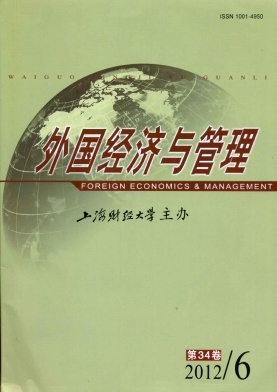组织学科的范式论及相关争辩探析
外国经济与管理 2012 年 第 34 卷第 06 期, 页码:41 - 48
摘要
参考文献
摘要
在过去的三十多年中,西方组织学科逐渐形成了兼含实证主义、解释主义、批判主义、后现代主义等多元趋向的研究体系,而这一开放性学科研究体系的形成在很大程度上得益于范式论思想。本文试图厘清西方组织学界有关范式论的主要观点及相关争辩,以期为读者整体理解和把握西方组织学界的多视角研究现状提供启示。
①“中层理论”一词源自社会学。社会学家默顿在其《论理论社会学》(1990译本)一书中对“中层理论”概念的内涵及特性做了详细介绍。他指出“中层理论既非日常研究中大批涌现的微观而且必要的操作性假设,也不是一个包罗一切、可用来解释所有我们可观察到的社会行为、社会组织和社会变迁的自成体系的统一理论,而是介于这两者之间的理论”(第54页),并介绍了“中层理论”的八项具体特征(第92页)。组织学者陈昭全和张志学(2008)也在《管理研究中的理论建构》一文(见陈晓萍、徐淑英和樊景立主编的《组织与管理研究的实证方法》一书)中对此进行了引用与解释。
[1]Behling O.Some problems in the philosophy of science of or-ganizations[J].The Academy of Management Review,1978,3(2):193-201.
[2]Bernstein R J.Beyond objectivism and relativism:Science,her-meneutics,and praxis[M].Philadelphia:University of Penn-sylvania Press,1983:79.
[3]Burrell G and Morgan G.Sociological paradigms and organiza-tional analysis[M].London:Heinomann Educational Books Ltd.,1979:xii,xiv,1,8,24-25,32,397.
[4]Clegg S.Managing organization futures in a changing world of power/knowledge[A].Tsoukas H and Knudsen C(Eds.).The oxford handbook of organization theory[C].New York:Oxford University Press,2003:548.
[5]Deetz S.Describing differences in approaches to organization science:Rethinking burrell and morgan and their legacy[J].Organization Science,1996,7(2):191-207.
[6]Donaldson L.In defence of organization theory:A reply to the critics[M].Cambridge:Cambridge University Press,1985:35,43,45.
[7]Donaldson L.American anti-management theories of organiza-tion:A critique of paradigm proliferation[M].Cambridge:Cambridge University Press,1995:5,9,43,45.
[8]Gioia D A and Pitre E.Multiparadigm perspectives on theory building[J].The Academy of Management Review,1990,15(4):584-602.
[9]Hassard J.Multiple paradigms and organizational analysis:A case study[J].Organization Studies,1991,12(2):275-299.
[10]Hassard J.Sociology and organization theory:Positivism,paradigms and postmodernity[M].Cambridge:Cambridge University Press,1995:68,75.
[11]Jackson N and Carter P.In defence of paradigm incommensu-rability[J].Organization Studies,1991,12(1):109-127.
[12]Kelemen M.Paradigm incommensurability[A].Clegg S R and Bailey J R(Eds.).International encyclopedia of organi-zation studies(Volume4)[C].Thousand Oaks,CA:Sage Publishers,2008:1217-1218.
[13]Lewis M W and Grimes A J.Metatriangulation:Building theory from multiple paradigms[J].The Academy of Ma-nagement Review,1999,24(4):672-690.
[14]Marsden R.The politics of organizational analysis[J].Orga-nization Studies,1993,14(2):93-124.
[15]Mintzberg H.Mintzberg’s final paradigm[J].Administrative Science Quarterly,1978,23(4):635-636.
[16]Pfeffer J.Barriers to the advance of organizational science:Paradigm development as a dependent variable[J].The A-cademy of Management Review,1993,18(4):599-620.
[17]Reed M.Redirections in organizational analysis[M].London:Tavistock Publications,1985:189,190,194,197-198.
[18]Scherer A G and Patzer M.Paradigms[A].Clegg S R and Bailey J R(Eds.).International encyclopedia of organization studies(Volume4)[C].Thousand Oaks,CA:Sage Publishers,2008:1218-1222.
[19]Strauss G and Hanson M.Book review:American anti-management theories of organization:A critique of paradigm proliferation[J].Human Relations,1997,50(9):1177-1190.
[20]Tsoukas H and Knudsen C.Introduction[A].Tsoukas H and Knudsen C(Eds.).The oxford handbook of organization theory[C].New York:Oxford University Press,2003:6.
[21]Willmott H.Breaking the paradigm mentality[J].Organiza-tion Studies,1993,14(5):681-719.
[22](美)伯勒尔.组织范式[A].佐尔格.组织行为手册[C].(清华大学经济管理学院编译).沈阳:辽宁教育出版社,1999:25-34.
[23]陈昭全,张志学.管理研究中的理论建构[A].陈晓萍,徐淑英,樊景立主编.组织与管理研究的实证方法[C].北京:北京大学出版社,2008:62-63.
[24](美)菲佛,萨顿.管理的真相[M].(闾佳,邓瑞华译).北京:中国人民大学出版社,2008:243.
[25](美)蒯因.从逻辑的观点看[M].(江天骥,宋文淦,张家龙,陈启伟译).上海:上海译文出版社,1987:1.
[26](美)库恩.科学革命的结构[M].(金吾伦,胡新和译).北京:北京大学出版社,2003:11.
[27]罗珉.论组织理论范式的转换[J].外国经济与管理,2008,(8):18-38.
[28](美)马奇.经验的疆界[M].(丁丹译).北京:东方出版社,2011:46.
[29](美)默顿.论理论社会学[M].(何凡兴,李卫红,王丽娟译).北京:华夏出版社,1990:54-92.
[30]孙绵涛.西方范式方法论的反思与重构[J].华中师范大学学报(人文社会科学版),2003,(6):110-125.
[31]张新平.关于组织管理的理论与范式的思考[J].南京师范大学学报(社会科学版),2000,(2):52-58.
[1]Behling O.Some problems in the philosophy of science of or-ganizations[J].The Academy of Management Review,1978,3(2):193-201.
[2]Bernstein R J.Beyond objectivism and relativism:Science,her-meneutics,and praxis[M].Philadelphia:University of Penn-sylvania Press,1983:79.
[3]Burrell G and Morgan G.Sociological paradigms and organiza-tional analysis[M].London:Heinomann Educational Books Ltd.,1979:xii,xiv,1,8,24-25,32,397.
[4]Clegg S.Managing organization futures in a changing world of power/knowledge[A].Tsoukas H and Knudsen C(Eds.).The oxford handbook of organization theory[C].New York:Oxford University Press,2003:548.
[5]Deetz S.Describing differences in approaches to organization science:Rethinking burrell and morgan and their legacy[J].Organization Science,1996,7(2):191-207.
[6]Donaldson L.In defence of organization theory:A reply to the critics[M].Cambridge:Cambridge University Press,1985:35,43,45.
[7]Donaldson L.American anti-management theories of organiza-tion:A critique of paradigm proliferation[M].Cambridge:Cambridge University Press,1995:5,9,43,45.
[8]Gioia D A and Pitre E.Multiparadigm perspectives on theory building[J].The Academy of Management Review,1990,15(4):584-602.
[9]Hassard J.Multiple paradigms and organizational analysis:A case study[J].Organization Studies,1991,12(2):275-299.
[10]Hassard J.Sociology and organization theory:Positivism,paradigms and postmodernity[M].Cambridge:Cambridge University Press,1995:68,75.
[11]Jackson N and Carter P.In defence of paradigm incommensu-rability[J].Organization Studies,1991,12(1):109-127.
[12]Kelemen M.Paradigm incommensurability[A].Clegg S R and Bailey J R(Eds.).International encyclopedia of organi-zation studies(Volume4)[C].Thousand Oaks,CA:Sage Publishers,2008:1217-1218.
[13]Lewis M W and Grimes A J.Metatriangulation:Building theory from multiple paradigms[J].The Academy of Ma-nagement Review,1999,24(4):672-690.
[14]Marsden R.The politics of organizational analysis[J].Orga-nization Studies,1993,14(2):93-124.
[15]Mintzberg H.Mintzberg’s final paradigm[J].Administrative Science Quarterly,1978,23(4):635-636.
[16]Pfeffer J.Barriers to the advance of organizational science:Paradigm development as a dependent variable[J].The A-cademy of Management Review,1993,18(4):599-620.
[17]Reed M.Redirections in organizational analysis[M].London:Tavistock Publications,1985:189,190,194,197-198.
[18]Scherer A G and Patzer M.Paradigms[A].Clegg S R and Bailey J R(Eds.).International encyclopedia of organization studies(Volume4)[C].Thousand Oaks,CA:Sage Publishers,2008:1218-1222.
[19]Strauss G and Hanson M.Book review:American anti-management theories of organization:A critique of paradigm proliferation[J].Human Relations,1997,50(9):1177-1190.
[20]Tsoukas H and Knudsen C.Introduction[A].Tsoukas H and Knudsen C(Eds.).The oxford handbook of organization theory[C].New York:Oxford University Press,2003:6.
[21]Willmott H.Breaking the paradigm mentality[J].Organiza-tion Studies,1993,14(5):681-719.
[22](美)伯勒尔.组织范式[A].佐尔格.组织行为手册[C].(清华大学经济管理学院编译).沈阳:辽宁教育出版社,1999:25-34.
[23]陈昭全,张志学.管理研究中的理论建构[A].陈晓萍,徐淑英,樊景立主编.组织与管理研究的实证方法[C].北京:北京大学出版社,2008:62-63.
[24](美)菲佛,萨顿.管理的真相[M].(闾佳,邓瑞华译).北京:中国人民大学出版社,2008:243.
[25](美)蒯因.从逻辑的观点看[M].(江天骥,宋文淦,张家龙,陈启伟译).上海:上海译文出版社,1987:1.
[26](美)库恩.科学革命的结构[M].(金吾伦,胡新和译).北京:北京大学出版社,2003:11.
[27]罗珉.论组织理论范式的转换[J].外国经济与管理,2008,(8):18-38.
[28](美)马奇.经验的疆界[M].(丁丹译).北京:东方出版社,2011:46.
[29](美)默顿.论理论社会学[M].(何凡兴,李卫红,王丽娟译).北京:华夏出版社,1990:54-92.
[30]孙绵涛.西方范式方法论的反思与重构[J].华中师范大学学报(人文社会科学版),2003,(6):110-125.
[31]张新平.关于组织管理的理论与范式的思考[J].南京师范大学学报(社会科学版),2000,(2):52-58.
引用本文
龚小君. 组织学科的范式论及相关争辩探析[J]. 外国经济与管理, 2012, 34(6): 41–48.
导出参考文献,格式为:
下一篇:国外员工品牌化行为研究进展评介





 4935
4935  261
261

